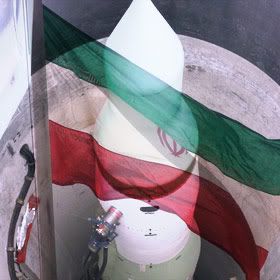Iran's Nukes: Gadzooks! and Pukes!
 The media at its best and worst is on display as reporters and analysts pick over the bones of the NIE report on Iran's nuclear capabilities. Some, the "gadzooks!," give new insights directed at those who need them; others, the "pukes!" play insignificant old journalistic games with significant news.
The media at its best and worst is on display as reporters and analysts pick over the bones of the NIE report on Iran's nuclear capabilities. Some, the "gadzooks!," give new insights directed at those who need them; others, the "pukes!" play insignificant old journalistic games with significant news.The latter first:
CNN (surprized?) puked with this story:
President Bush was told in August that Iran's nuclear weapons program "may be suspended," the White House said Wednesday, which seemingly contradicts the account of the meeting given by Bush Tuesday. ...Let's see if I have this right. We have a story that deals with the capabilities of our intelligence community, the threat of nuclear jihad, foreign relations with Russia, Germany, France, England and of course Tehran ... and CNN thinks the story is a "what did he know and when did he know it" tripe-a-thon design to keep their Bush-bashing record pure?
President Bush was told in August that Iran's nuclear weapons program "may be suspended," the White House said Wednesday, which seemingly contradicts the account of the meeting given by Bush Tuesday.
Did Bush bomb Tehran sometime between August and now and we missed it? Have the rules changed so that names will break Ahmahdinejad's bones but sticks and stones will never hurt him? Is there any harm in keeping up pressure on a country that is waging a proxy war against us in Iraq while trying to deceive the world about the nature of its nuclear program?
Then there's the "Gadzooks!" story, penned today by John Bolton in WaPo.
First, having a view that's contrary to the editorial line of a paper is a celebration of American journalism. It's good that Inside-the-Beltway liberal readers get regular doses of Bolton; and this one is a maga-dose, making many big points, some of which we're already familiar with: that the "headline finding" of the report -- that Iran has supposedly stopped its nuke weapons program -- "is written in a way that guarantees the totality of the conclusions will be misread."
In fact, there is little substantive difference between the conclusions of the 2005 NIE on Iran's nuclear capabilities and the 2007 NIE.Take it from the PR guy, how you word something can make a huge difference. In this case, the words are about the Mullah's psychology and motivation, not nuclear hardware and technology ... hence, "moderate" assurance in the findings and, as Bolton points out, considerable disention among intelligence analysts regarding Iran's alleged suspension of activities.
Funny. That dissension didn't make the headlines.
Bolton points out that the writers of the NIE are keen to stray into policy issues and far afield from mere intelligence:
It implies that Iran is susceptible to diplomatic persuasion and pressure, yet the only event in 2003 that might have affected Iran was our invasion of Iraq and the overthrow of Saddam Hussein, not exactly a diplomatic pas de deux. As undersecretary of state for arms control in 2003, I know we were nowhere near exerting any significant diplomatic pressure on Iran. Nowhere does the NIE explain its logic on this critical point.Bolton also details the difficulty in getting good intelligence from Iran, especially since many older, trusted sources have disappeared, replaced with newer, less trustworthy sources.
But ultimately, he paints a picture of bureaucrats -- many from State, not the intelligence community, over-analyzing a couple new pieces of intelligence to the point that their opinions came to mean more than the implications or validity of the intelligence itself.
The take-away from the CNN piece is simple: The media will fight over the bones of a story long after the meat is gone, and we gain nothing from it but a better understanding of the media.
From WaPo's op/ed, the take-away is much more complex: We see a government process that is troubling from a policy perspective, flawed from an intelligence perspective and misinterpreted from a media perspective, leaving us with questions at a time when facts would be much more comforting.
hat-tip: memeorandum
Labels: Bolton, Iran, Media bias, MSM, War on Terror




<< Home